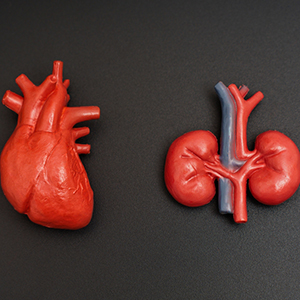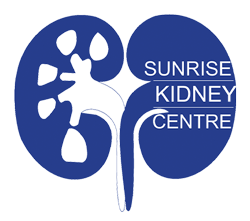Cardio Renal Disease treatment in Vijayawada
Cardiorenal disease is a complex interplay between heart and kidney dysfunction, where impairment in one organ often exacerbates the other. This condition is characterized by interconnected pathophysiological mechanisms such as volume overload, neurohormonal activation, and inflammation, leading to progressive deterioration of both cardiac and renal functions. Commonly seen in conditions like heart failure and chronic kidney disease, it significantly increases morbidity and mortality. Effective management requires a multidisciplinary approach targeting fluid balance, blood pressure control, and addressing underlying causes. Advances in biomarker research and personalized therapies hold promise for improving outcomes, emphasizing the need for early detection and integrated care strategies to mitigate the devastating impacts of this dual organ disorder.
Symptoms

Cardiorenal disease manifests through a variety of symptoms reflecting the interconnected dysfunction of the heart and kidneys. Individuals frequently encounter symptoms such as exhaustion, difficulty breathing, and fluid buildup, which can cause swelling in the lower extremities including legs, ankles, and abdominal area. Reduced exercise tolerance and persistent cough are common, alongside symptoms like nausea and confusion due to toxin buildup. Elevated blood pressure and irregular heartbeat may also indicate underlying issues. As the disease worsens, signs such as rapid weight gain, decreased urine output, and chest pain can emerge, signaling severe cardiovascular and renal compromise. Early recognition of these symptoms is crucial for timely intervention by a nephrologist in Vijayawada for better or improved outcomes.
Is cardio renal disease fatal?
Cardiorenal disease poses significant health risks, intertwining heart and kidney dysfunctions that can exacerbate each other, leading to increased morbidity and mortality. The primary dangers include heart failure, where compromised cardiac output diminishes kidney perfusion, causing fluid overload and hypertension, which further strain both organs. Additionally, chronic kidney disease impairs waste elimination, escalating cardiovascular risk through electrolyte imbalances and hypertension. This vicious cycle heightens vulnerability to arrhythmias, stroke, and sudden cardiac death. Moreover, the systemic inflammation and oxidative stress associated with cardiorenal syndrome accelerate vascular damage, increasing the likelihood of atherosclerosis and ischemic events, underscoring the critical need for early detection by a top nephrologist in Vijayawada and integrated management strategies.
Treatment options available
Cardio Renal Disease treatment in Vijayawada requires a multidisciplinary approach aimed at optimizing cardiac and renal function. Pharmacologic strategies include the use of renin-angiotensin-aldosterone system inhibitors such as ACE inhibitors or ARBs to reduce progression, alongside diuretics to manage volume overload. Careful fluid management is crucial to avoid exacerbating either organ's dysfunction. Addressing underlying causes like hypertension, diabetes, or ischemic heart disease is vital. Kidney hospitals in Vijayawada have also started to use emerging therapies like SGLT2 inhibitors show promise in improving outcomes. Close monitoring, lifestyle modifications, and patient education are essential components to prevent disease progression and improve quality of life, emphasizing individualized treatment plans tailored to each patient’s clinical profile.
Dr. M.V. Sai Krishna is a distinguished nephrologist in Vijayawada, celebrated for his innovative approach and empathetic patient care at Sunrise Kidney Centre, a facility equipped with state-of-the-art technology for acute kidney failure treatment in Vijayawada, combined with his commitment to personalized treatment plans, has established Sunrise Kidney Centre as the premier destination for sophisticated nephrology services in the region.

